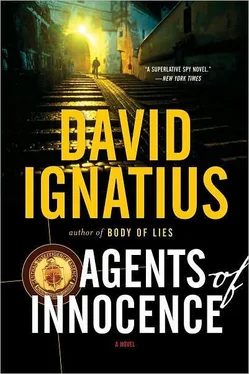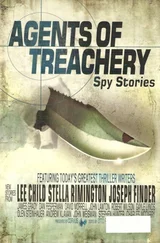David Ignatius - Agents of Innocence
Здесь есть возможность читать онлайн «David Ignatius - Agents of Innocence» весь текст электронной книги совершенно бесплатно (целиком полную версию без сокращений). В некоторых случаях можно слушать аудио, скачать через торрент в формате fb2 и присутствует краткое содержание. Жанр: Шпионский детектив, на английском языке. Описание произведения, (предисловие) а так же отзывы посетителей доступны на портале библиотеки ЛибКат.
- Название:Agents of Innocence
- Автор:
- Жанр:
- Год:неизвестен
- ISBN:нет данных
- Рейтинг книги:3 / 5. Голосов: 1
-
Избранное:Добавить в избранное
- Отзывы:
-
Ваша оценка:
- 60
- 1
- 2
- 3
- 4
- 5
Agents of Innocence: краткое содержание, описание и аннотация
Предлагаем к чтению аннотацию, описание, краткое содержание или предисловие (зависит от того, что написал сам автор книги «Agents of Innocence»). Если вы не нашли необходимую информацию о книге — напишите в комментариях, мы постараемся отыскать её.
Agents of Innocence — читать онлайн бесплатно полную книгу (весь текст) целиком
Ниже представлен текст книги, разбитый по страницам. Система сохранения места последней прочитанной страницы, позволяет с удобством читать онлайн бесплатно книгу «Agents of Innocence», без необходимости каждый раз заново искать на чём Вы остановились. Поставьте закладку, и сможете в любой момент перейти на страницу, на которой закончили чтение.
Интервал:
Закладка:
Rogers smiled an impenetrable smile.
“Is that right?” he answered blandly. “Still on the top of your list, eh?”
“Yes.”
“What sort of list might that be?”
“You know what I am saying, Mr. Rogers. You know what kind of list.”
“Let me get this straight,” said Rogers. “You are telling me that the new Israeli government is planning to kill Jamal Ramlawi?”
Levi said nothing. His face was turning red. He gave a slight nod.
“And why are you telling me this?”
“Because I thought it might be of interest to you.”
Levi looked at Rogers, so deliberate in this conversation, dragging out every word. He wanted to shake him: Say it. Say it! Say no. Say we can’t kill him because he works for you. Say you want him alive. Just say it. Tell us. That’s all we ask.
But Rogers said nothing. He walked in silence for what seemed like a minute, his face utterly still, his head lost in thought. At length, he spoke again.
“I don’t know what you’re talking about,” he said. “Please tell that to your colleagues back in Tel Aviv. Tell them that Tom Rogers doesn’t know what they’re talking about.”
“Very well,” said Levi. He looked crestfallen. He had failed.
“It’s time we got back,” said Rogers. “We’ve got the Canadians on Quebec separatism.”
They crossed Trafalgar Square again and walked in silence back down Whitehall. Rogers lit another cigarette. This time he didn’t offer one to the Israeli. When they neared the Foreign Office, Rogers excused himself and sat down on a bench in Parliament Square. He had an unsettled feeling in his gut, like what you feel when you remember a promise made long ago that you had almost forgotten. Rogers mentally reviewed his schedule over the next few weeks and decided that he could spare a few days to see some old friends in Beirut.
43
Beirut; October 1978
Fuad sat in his hotel room, waiting for Rogers. He said a prayer silently, not on the floor facing Mecca but in his T-shirt, facing the mirror. Fuad missed his old apartment, but what could he do? It was gone, the victim of a stray artillery shell from Christian East Beirut.
Rogers was coming! It was a great event. They hadn’t told Fuad why Rogers was coming, but they never did these days. They just said that Rogers was coming to Beirut on a brief mission, and that he wanted to see Fuad as soon as he arrived. What could that mean? Fuad hoped it didn’t have anything to do with Camp David, which had already become a curse word in West Beirut.
A few minutes after 8:00 A.M., Fuad saw a familiar figure in the distance. It was Rogers, unmistakably. Tall and slim, his hair blowing slightly in the wind, his face intent and detached at the same time. Rogers neared the hotel. He was dressed in a gray flannel suit, a blue striped shirt open at the collar, and a pair of cowboy boots. To Fuad, he looked ageless and rumpled in the relaxed way of the Americans. There was a half-smile on his face and an absent expression. He disappeared from Fuad’s view as he entered the hotel.
Fuad listened for Rogers’s footsteps. He knew the sound by heart from a hundred meetings in safehouses and hotel rooms. Rogers would take the stairs, not the elevator, to make sure that no one saw which floor he stopped at. There would be the sound of his shoes reaching the top stair, a pause as he looked around, a slow amble for a few steps, then a quicker pace. Then a soft knock and the code words.
There was a knock.
“Am I early?” said the voice outside the door.
“No, you are right on time.”
The American entered the room, closed the door firmly, and then opened it a crack to make sure that he hadn’t been followed. The hall was empty. The two men, case officer and agent, embraced each other, exchanged pleasantries in Arabic, and offered each other cigarettes.
“You have come back!” said Fuad.
“There isn’t much left to come back to,” said Rogers. He walked to the window and pulled back the drapes a few inches to survey the ruined city. It had all changed. The American gazed out toward the kidney-shaped swimming pool of the hotel, now filled. with debris, and to the skyline beyond, which became increasingly pockmocked with shellholes as it moved toward the Green Line that divided the Moslem and Christian halves of the city. There had been considerable new damage in the last few months, caused by artillery duels between the Christians in East Beirut and the Palestinians and Syrians in the West.
Rogers cursed under his breath.
“I am glad that you have come back,” said Fuad. “I knew that you would! It is part of your nature.”
“No it isn’t,” answered Rogers. “It’s part of my job.”
He gestured toward the window. “This country has gone mad.”
“Yes, it is your nature,” said Fuad, continuing as if he hadn’t heard. “It is inescapable.”
Fuad pointed to a Koran on the coffee table and recited something in Arabic. It was a sura from the Koran: God is the light of Heaven and Earth. His light may be compared to a niche which contains a lamp, the lamp within glass, and the glass shining as if it were a star of pearl.
“You are becoming more religious, Fuad,” said Rogers. “That’s sensible.”
“We are all prisoners of fate.”
“Have it your way,” said Rogers. “But I should warn you that I’m not staying for very long.”
They sat down on the couch and reminisced. As they talked, Rogers was struck by the passage of time and the changes it brings. Even in someone like Fuad, who had seemed impervious to time. Rogers could remember the eager young Lebanese agent of 1969, in love with America and everything it stood for, eager to discard his Arab identity like an unwanted skin, ready to help America liberate the Arab world from its torpor and backwardness. The Fuad of 1969 would no more have quoted the Koran than jumped out the window. But times had changed.
“I need your help on something,” said Rogers.
“I am at your service,” replied Fuad.
“I need to see Jamal Ramlawi in a hurry. This week. In the next few days if possible.”
“Why not? I think he is in town. I will see what can be arranged.”
“Don’t ask him,” said Rogers. “Tell him!”
While Rogers waited for Fuad to arrange the meeting, he paid a call on Samir Fares. Fares had been named head of the Lebanese Deuxieme Bureau two months earlier. When Rogers had heard the news back in Washington, he had been delighted. But it had reminded him of a promise he had made to Fares long ago.
Fares suggested that Rogers pick him up at his new office, in the Presidential Palace in Baabda, in the hills above East Beirut. The Beirut station provided a car and a driver, a tough little Christian named Youssef. The trip gave Rogers a quick and depressing tour of the city. It was like visiting a person who is dying.
The journey began in the shopping district of Hamra, once the elegant meeting place of East and West, now as faded as the cosmopolitan ideal it represented. They drove past the shop where Rogers had bought birthday gifts for his wife, and past another shop where he had once bought, in a reckless moment, a string of pearls for Solange Jezzine. Both stores were now shuttered and closed.
They drove on past blocks of bombed-out buildings, a noman’s-land inhabited now only by snipers and Kurdish refugees, which signalled the approach of the Green Line. Rogers lit a cigarette. So did the driver. In Lebanon, Rogers remembered, smoking was a kind of ritualized sacrament, administered several dozen times a day.
Rogers had crossed the Green Line before, but he still found it unsettling. Rogers hated snipers. They were a symbol of the sickness that had seized the country: bored teenagers, hiding behind sandbags on either side of the line, gobbling speed to stay awake, earning $100 a month plus a chance to swagger around town with automatic weapons, shooting at people without knowing who they were. The only consolation, Rogers thought, was that their aim wasn’t very good. In that regard they were Lebanese. Better at the show of things than at the substance.
Читать дальшеИнтервал:
Закладка:
Похожие книги на «Agents of Innocence»
Представляем Вашему вниманию похожие книги на «Agents of Innocence» списком для выбора. Мы отобрали схожую по названию и смыслу литературу в надежде предоставить читателям больше вариантов отыскать новые, интересные, ещё непрочитанные произведения.
Обсуждение, отзывы о книге «Agents of Innocence» и просто собственные мнения читателей. Оставьте ваши комментарии, напишите, что Вы думаете о произведении, его смысле или главных героях. Укажите что конкретно понравилось, а что нет, и почему Вы так считаете.












